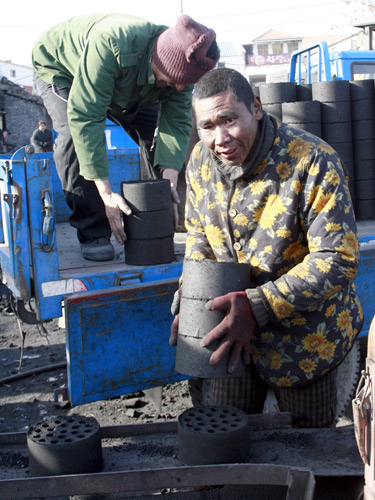Mentally disabled workers 'well treated'
Two briquette factories in Jinan, capital of east China's Shandong Province, were found on Friday to employ eight mentally disabled workers, but treated the employees well, authorities have said.
 |
|
Laborers work at a briquette factory on Huashan West Road in Jinan, capital of Shandong Province, on Dec 15. The factory reportedly employs four mentally disabled workers. |
The case came soon after a sweatshop in the Xinjiang Uygur Autonomous Region was found to have enslaved and abused 12 such employees.
Mao Haibo, head of the labor security supervision team of Jinan's Licheng district, also pointed out the difference in the workers' treatment in the two locations.
The Jinan factories, each of which had four workers with mental disabilities, did not sign labor contracts with any employees, Mao told China Daily on Sunday. "But we did not find they had enslaved or tortured laborers," he added.
Huashan Gaojia briquette factory owner Qu Fuhong said her plant employs about a dozen workers, and the four with mental disabilities were vagrants before they were hired.
"They were eating out of trashcans every day," Qu said. "Some kind people introduced them to my factory."
Qu said the mentally ill workers eat the same meals she does. She buys them cigarettes and alcohol, she said, although she does not pay them.
"I do not pay them because they don't even know what a banknote is," she said. "We do not force them to work."
When China Daily asked one of the workers with disabilities his surname, the man alternately and indistinctly muttered "Wang" and "Zhang". Asked if he eats well, he grunted an affirmative-sounding utterance.
Zhang Lihua, who owned a supermarket across from the factory, said Qu often visited the store to buy cheap cigarettes. "No disputes have been heard from the factory," Zhang said.
The boss of the other factory in Jinan, Wang Qiang, was quoted by local media as saying the workers are free to come and go as they please. Wang also gives them pocket money for snacks, the report said.
Mao said the district labor security supervision team has urged both employers to sign contracts with their workers, pay them at least minimum wage and provide their social security.
The local labor bureau and disabled persons' federation are discussing ways in which to protect the interests of workers with mental disabilities, Mao said.
"We will allow the two factories to continue to employ workers with mental disabilities as long as they provide decent food and board, and pay them," Mao explained.
"We will help send workers home if they can remember where they are from."
Employers should also regularly contact the guardians of those workers who have custodians, he added.
"If slavery-like practices or torture are found to take place in the factories, those responsible will receive severe legal punishment," he said.
Zhao Wei, deputy director of the China Labor Studies Center at Beijing Normal University, said the country encourages factories and companies to employ people with disabilities.
"People with disabilities can contribute labor if trained," she said.
"The precondition is that they should be legally employed and well treated."
 0
0 






